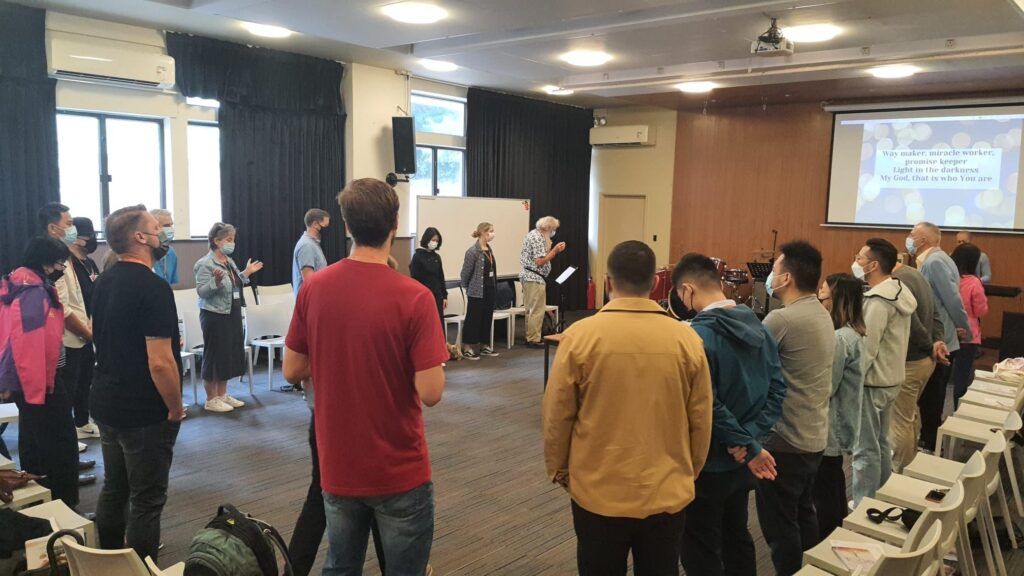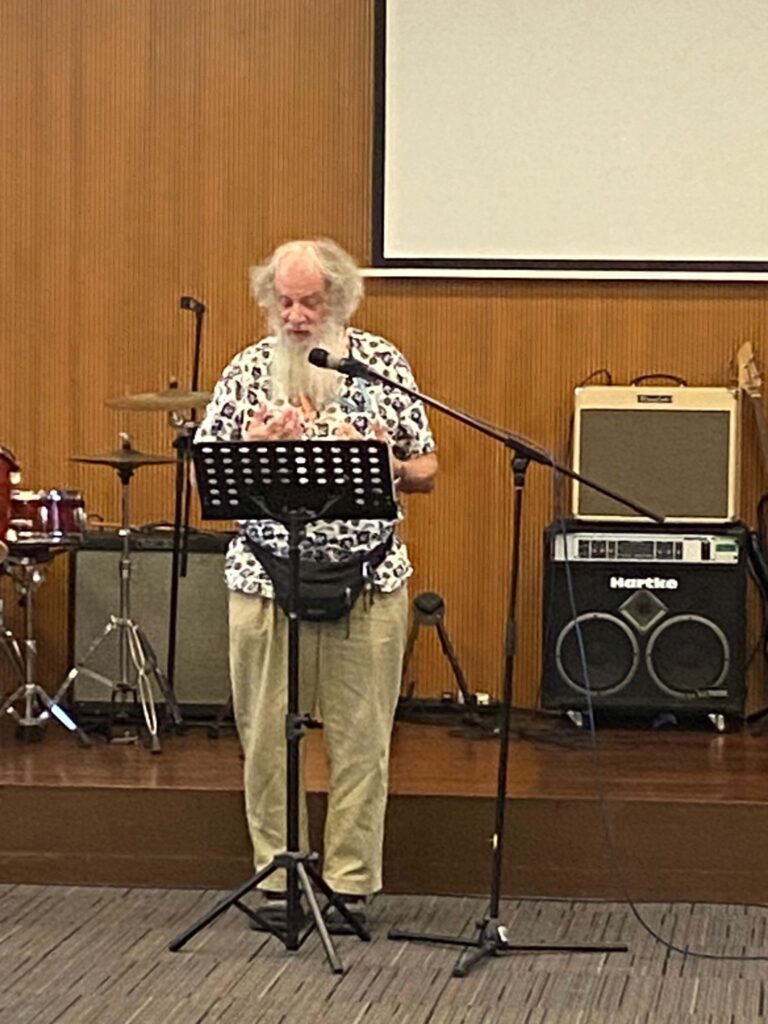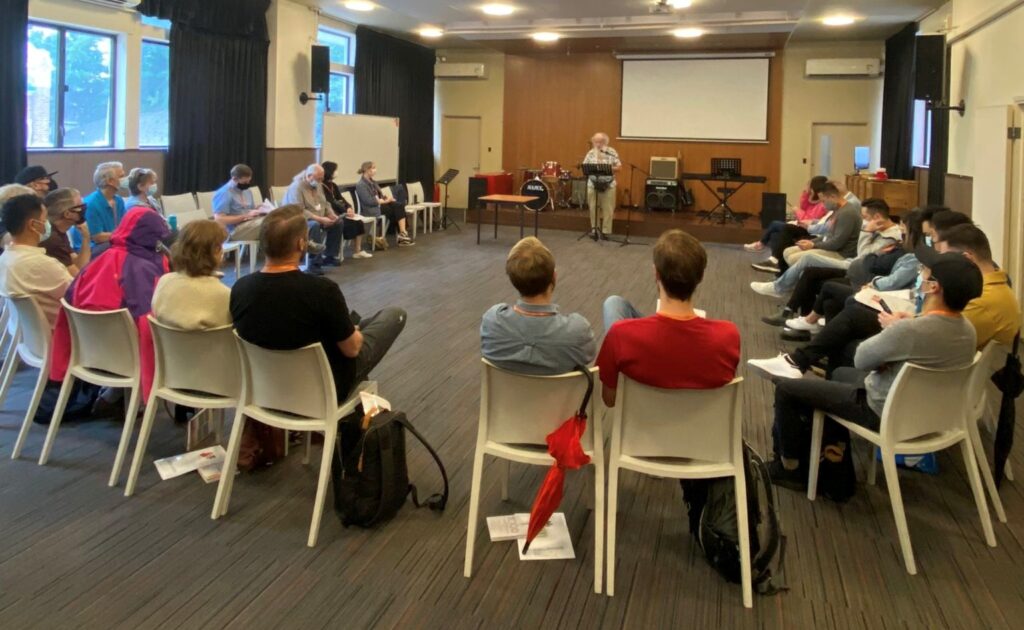Compassion, transformation, and unity

Introduction to Christfulness emphasizing Compassion, Transformation, and Unity
at Hong Kong International Pastors’ Retreat, 25th November 2022

What is Christfulness?
We use the term Christfulness for describing the purpose and aim for God creating humans in the image and likeness of God. This means that we are created to grow and to become like Jesus in his relationship with God – his and our Father – and in his relationship to others. Our relationship with one another should reflect our relationship to God. God’s fullness of grace and truth, love, justice, compassion, peace is revealed in Jesus Christ, and he in turn shares God’s fullness with the church, the fellowship of believers that is Christ’s body. As believers we are called to have Christ’s fullness as our measure; it is the measure of maturity – as St. Paul states in Ephesians 4:12-13: “the body of Christ [should] be built up until we all reach unity in the faith and in the knowledge of the Son of God and become mature, attaining to the whole measure of the fullness of Christ.”

This growth is individual as well as corporate. It could be said to follow four phases:
- The experience of Christ with me
- The experience of Christ in me
- The experience of Christ in you
- The individual and corporate experience of being in Christ; together in Christ
When we speak of Christ in me,we are speaking of the human person as created in God’s image. We speak of our original human nature, which has been damaged, but which is restored to us in Christ. When we speak of Christ with me this means that human nature is not understood solely from ourselves, but from our relationship to Jesus Christ, and when we speak of Christ-in-you this means that human nature is developed in relation to other persons and that we meet others in welcoming and non-judgmental way as brothers and sisters. Together in Christ suggests that the fulfilled human nature is found in the fellowship of men and women as one redeemed humankind which is the body of Christ.
Christ with me
Our starting point is Jesus’ promise to be with his disciples always, everywhere, to the ends of the earth. This is the foundational promise given to us as we start our life as his followers through baptism and faith. Jesus, being with us, invites us to share his relation to his and our heavenly Father. … …
This conviction that I am not alone because I am a child of God, loved and appreciated is the foundation for our engagement with others and the surrounding world in compassion; on this foundation we dare enter the process of transformation; and on this foundation unity between all children of God can be built.
Knowing that I am a child of God, loved and appreciated means that I can meet other people feeling safe. Nothing people can say and do can alter this inner assurance of being loved and appreciated nor alter the assurance that Christ is with me. This is important as we engage in meeting and serving people in great need and as we share the gospel with them. Some people may not respond politely or kindly as we approach them because they feel threatened or ashamed of their situation, or because they are mentally unstable. Sometimes we may feel that people take advantage of our generosity, that they try to cheat us. But this cannot shake our inner child of God – neither can slander, scheming, persecution: Christ is with me; I am a child of God, loved and appreciated. We dare to love and to receive love.
One of our main practices is the healing of the heart that strengthens this inner conviction of being God’s child, loved and appreciated. We often pray with people for experiencing this healing. On YouTube you will find a healing of the heart meditation that is conducted in the form of a prayer, and this will give you an idea of how to pray with people for this inner assurance.
Christ in me
Christ is not only with me; Christ is in me. Christ lives in me by faith, and this means that God’s image in which I was created is restored to me. The original nature of humans is that we are created in God’s image to grow into his likeness, and as Jesus Christ is described as “the radiance of God’s Glory” and “the exact representation of God’s being (Hebrews 1:3), and as “the image of the invisible God” (Colossians 1:15) we can just as well speak of being created in the image of Christ to grow into Christ’s likeness, to become like Jesus Christ.
To say “Christ in me” is the same as saying the image of God in me; it says that Christ grows in me, in the very centre of my being, and takes form in me. We were created and saved to have the same mind as that of Christ Jesus (Philippians 2:5), i.e. we were created for compassion and serving love and are set free by Christ’s serving love to once more be stewards of God’s creation with Christ and “to bring good news to the poor, … to bring release to the captives,” … to bring healing to the diseased, and “to let the oppressed go free” (Luke 4:18), as Christ baptizes us with God’s Spirit. God’s image in me is intact when my inner being reflects God in God’s approach to me.
We are created to reflect the creative light of God as a mirror reflects what is in front of it, so that God can recognize God-self in us, and so that our fellow beings can know God by the light which shines from us, as a reflection of God. This light is often not as clear as it could be. The mirror is dirty or covered over.
What then can be the reason for this grime? It can come from our thoughts, our feelings, or our memories. Our thoughts contain so many impressions of ourselves and others, of our lives, our successes, and failures. Our inner being can contain ideas about ourselves, about God, and other people, but these are our conceptions, and not necessarily reality. We are judgemental and are making judgements or we make other people or things/objects in the world into our idols or something to fear. Therefore, this creates a distance or separation in our relationships to others, to God, and to our true selves.
Our heart needs cleansing, and on our part, there is also the need of a trusting yes to God’s saving presence in Jesus Christ.
St. Paul speaks of a cleansing and a kind of spiritual dying as a part of this Yes to God: “I have been crucified with Christ and I no longer live, but Christ lives in me. The life I now live in the body, I live by faith in the Son of God, who loved me and gave himself for me.“ (Gal. 2.20).
Our personal transformation starts with the assurance of being a child of God because Christ is with me, and the process towards maturity goes on as Christ through the Holy Spirit cleanses our heart and he lives in me so that I may be Christ-formed and have the same mind as Christ, being motivated by a will to serve others in love.
Practices:
- Confession of sin – daily in our personal prayers, and from time to time in the presence of a fellow Christian who can proclaim the forgiveness of sin to us
- Take a time in Christ’s loving presence and ask the Holy Spirit to reveal one or two of your false conceptions of God, your self and the world around. Then breathing out you let go of the false conception(s), and receive the infilling of Christ’s love, peace, and joy at your breathing in. You’ll find this meditation here: Christfulness Meditation: Cleansing of the heart – YouTube
- Another practice is the Jesus-prayer, which is a good practice for this and for maintaining Christ in Me.
- Sit comfortably. Follow your breath. Focus on the heart.
- Breathing in you pray: Jesus Christ, Son of God
- Breathing out you pray: Have mercy on me.
- As you sense Jesus’ presence, just enjoy the time with him. When attention falters, just repeat the prayer following your breath.
You’ll find the Jesus-prayer here:
Christ in you
As we focus on compassion, we primarily consider the Christ-in-you-aspect of Christfulness.
When I experience Christ in me, I wake up to the reality, that every human being is created in the image of God. This realization means that we also begin seeing our fellow humans and fellow creatures with new eyes. Christfulness leads to awareness and an attentive or heedful presence in the world and among people. We begin looking for the image of God in the other person. And we begin seeing others with the eyes and heart of Jesus, because Christ is God’s image in our heart.
The Christ-in-you experience is the reason for a non-judgmental attitude towards others and the environment. Jesus wants us to see the other person as a child of God, and he wants us to see the potential disciple in him/her. Therefore, Jesus teaches us to love our enemies and pray for those who persecute us. …

Diaconia is a main faith practice of the Christ-in-you aspect of CFN. We are inspired by Jesus’s way of meeting others. Many great personalities in the course of history have realized the ideal of seeking God’s image in the other. In our time we might think of Mother Theresa, who chose to meet those who were most exposed to the misery of Indian slum with works of compassion, because she saw Christ in them. Somehow, she was living in accordance with Jesus’ parable of the great doom (Matthew 25:31-46):
… … ‘Lord, when did we see you hungry and feed you, or thirsty and give you drink? And when did we see you a stranger and welcome you, or naked and clothe you? And when did we see you sick or in prison and visit you?’ And the King will answer them, ‘Truly, I say to you, as you did it to one of the least of these my brothers, you did it to me.’ … …
We look out for God’s image in the other person. We find Christ in him/her. We can’t any longer judge the other person. Jesus calls it hypocritical to make oneself the judge of one’s neighbour. It’s like wanting to take a speck of sawdust out our neighbor’s eye when there is a plank in our own eye. (Mathew 7:1-6). Often our judging the other person is a projection and enlargement of our own faults.
Jesus emphasizes that there is no respect of persons with God, who causes his sun to rise on evil and good and sends rain on the righteous and the unrighteous. He shows it in praxis in his meetings with humans. Examples are:
- Meeting Levi, he does not see the tax collector or publican, but he sees Levi; he does not see him in a role, but as a person (Mark 2,13-17)
- Meeting the woman caught in adultery, he does not let the mob stone her to death, but discloses their hypocrisy and faultfinding, and he lets her go with the encouragement not to sin anymore (John 8:1-11)
- Meeting the lepers, he does not treat them as unclean and outcasts, be he touched them and healed them. (Mark 1:40-43 et al.).
Jesus teaches us to follow him; he is the Master; we are his disciples or apprentices. As he is, we shall become. Our relationship with other humans shall therefor mirror God’s relationship to us. We are called to live with no respect of persons, treating everyone as equals, and try not to judge and project our own shadow sides, ideals, or feelings on other persons.
Jesus was compassionate, and it was compassion that from the very beginning motivated the Son of God to incarnate as one of us and become the son of man. Compassion literally means suffering with another, sharing the other’s suffering, taking part in it, engaging in it. God’s Son could not bear to witness our estrangement from God and from God’s plan for human life, that we due to sin made others the victims of our own desires for success. We were subject to abuse, oppression, sickness, disease, poverty, hunger, and death. God’s Son loved humans and was seeing that his image was hidden away and forgotten by humans. God’s Son became a human person to restore God’s image and raise humans to their dignity as God’s sons and daughters.
He set us free to be what we were created for, and he fills us with his compassion. If we truly experience his love and return his love this should be reflected in loving others and seeing God’s image in them, we love Christ in them and will guard their dignity as God’s beloved children.
Compassion means a willingness to lay aside personal comfort to meet the one in need, meet him or her as a brother or sister. Compassion is not just a feeling or mood, or a state of mind. Compassion involves action. You cannot be compassionate without being present to the other in full awareness. There should be no judging others or liking others based on position, status, life circumstances, race, or gender.
Together in Christ
As St. Paul points to Christfulness as the measure of maturity he moves from the individual to the communal or interpersonal. Our individual transformation begins with our realization that Christ is with us and makes us experience ourselves as God’s children and it is followed by the restoration of our original nature as being created in God’s image as Christ is born in us as our new being by faith and the Holy Spirit. We are transformed into having the same mind as Christ; we are transformed into being compassionate, serving others in love. Seeing Christ or God’s image in the other creates relationships. We are no longer alone with Christ on the way, but we are on the way with all in whom we recognize God’s image.
For our transformation to be fulfilled we must find ourselves in Christ. The final transformation can only take place in the Body of Christ as we serve each other as members of his Body with the gifts of grace that the Spirit bestows on us. The maturity that contains Christ’s fullness as it flows from God’s fullness of grace and truth, love, justice, compassion, peace – is the maturity of the Christian fellowship as one body or one man/person as St. Paul says in Ephesians 4 and as it is spelled out in the rest of his letter. To sum up what St. Paul is writing:
Paul describes how apostles, prophets, evangelists, teachers, and shepherds serve the faithful to build up the community. The goal is unity in faith and knowledge of Jesus Christ as God’s Son so that the fellowship is as one person. This is presented as a growth into maturity, and the measure of this maturity is Christfulness, i.e., the fullness of Christ / τὸ πλήρωμα τοῦ χριστοῦ (to pleroma tou Christou). Christfulness is the goal of Christian growth, and it means living in accordance with the fullness of God’s excellence, power, and love as revealed to us in Christ. Christfulness-living is using the spiritual gifts for the common good and the upbuilding of the congregation (4:1-16), and it is exchanging the old sinful habits with a holy life in humility, truthfulness, and gentleness (4:17-32). Christfulness-living consist of relations of love and not of desire; it is accountability and transparency (5:1-6). Christfulness-living is being led by the Holy Spirit so that relationship between Christ and the faithful is recognized in the relationship of husband and wife, of parents and children, and of masters and servants or slaves (5:15-6:9). Finally, Christfulness-living is a victorious life vis a vis the Devil and the evil powers (6:10-20).
Another important aspect of being in Christ is highlighted in St. Paul’s speaking of baptism as participation in the death and resurrection of Jesus Christ; the believers are buried with Christ to rise with him that we may live a new life. (Romans 6). The new birth is expressed in a way that links initiation with Jesus’ death and resurrection for our salvation. Baptism is leaving a life under the reign of sin for a life with Jesus Christ as our Master and Lord. In this new life we are called to live according to our conversion even though this life also is struggling with sin (Romans 7). Yet the power of the new life is the Holy Spirit. (Romans 8).
The Spirit’s new life in the power of the resurrection is a life in communion with all other believers. Baptism is initiation into the congregation as the body of Christ. It is a transformation from being only me to a life in service in the congregational fellowship, serving as one member serves all the body. Faith and baptism create a believers’ fellowship of equality in spite of sex, social status and nationality; we are one in the Lord, to whom we were baptized: “For as many of you as were baptized into Christ have put on Christ. There is neither Jew nor Greek, there is neither slave nor free, there is no male and female, for you are all one in Christ Jesus. And if you are Christ’s, then you are Abraham’s offspring, heirs according to promise.” (Galatians 3:26-28).
The life initiated through baptism is walking with Jesus, living as his disciple and preoccupied with him, his words and his works. His sacrifice sets the standard for the disciple’s life with the other disciples. Life is accomplished to the same degree to which we live for the good of each other. The greatest in the kingdom of God is he or she who serves, and love is greatest as it gives itself for the others. This is more than anywhere else expressed through the Eucharist and Holy Communion, in which the social dimension of our disciple relationship with Jesus is unfolded. This is another way of understanding what the Holy Spirit works in initiation: the Spirit makes us, who are many, into the one body of Christ, of which we are the members. Christian spirituality or piety can’t be separated from fellowship or community.
Holy Communion opens our eyes so that we understand that God’s image in us is restored in a priestly ministry on behalf of creation. The Eucharistic prayer gives God thanks for creation and redemption and teaches us to interpret the longing of creation for their Creator, and at the same time it makes us understand that we are called to be the embodiment of this hope of creation’s redemption. This redemption or restoration of the created world is pictured representatively in the bread and wine as gifts from God’s gifts to us, created entities given back to God, and received at new as carriers of Christ’s presence. The Eucharist pictures all of creation as created by God through the Word to bear witness to him who called creation into being from non-being, into existence from non-existence. And like the Creator has become our neighbor, we are the neighbors of creation. Like the Creator meets us as person to person, and calls us by our name, we’ll meet creation responsibly, and give it name in the face of God.

